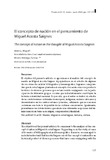| dc.rights.license | http://creativecommons.org/licenses/by-nc-sa/3.0/ve/ | |
| dc.contributor.author | Molina, Magdi | |
| dc.contributor.author | Rivero H., Yanixa R. | |
| dc.date.accessioned | 2010-07-28T23:26:01Z | |
| dc.date.available | 2010-07-28T23:26:01Z | |
| dc.date.issued | 2010-06-30 | |
| dc.identifier.issn | 1317-9535 | |
| dc.identifier.uri | http://www.saber.ula.ve/handle/123456789/31423 | |
| dc.description.abstract | El objetivo del presente artículo es aproximarse al análisis del concepto de
nación en Miguel Acosta Saignes. Apoyándonos en el estudio de algunas
de sus obras de carácter bibliográfico y hemerográfico, logramos comprender
que Acosta Saignes planteaba el concepto de nación como un producto
histórico de diversos procesos que se han venido conjugando con la participación
de diferentes grupos sociales que indudablemente constituyen la
historia e identidad nacional. Es por ello, que el autor se dedicó al estudio
de las contribuciones culturales de europeos, indígenas, esclavos africanos y
descendientes en los centros urbanos y rurales, señalando que las naciones
se forman con todo lo disponible de las culturas concurrentes. Igualmente,
presentamos un debate teórico que alude a las diferentes acepciones del término
nación en torno a su origen, componentes y finalidad. | es_VE |
| dc.language.iso | es | es_VE |
| dc.publisher | SABER ULA | es_VE |
| dc.rights | info:eu-repo/semantics/openAccess | |
| dc.subject | Nación | es_VE |
| dc.subject | Miguel Acosta Saignes | es_VE |
| dc.subject | Historia | es_VE |
| dc.subject | Cultura | es_VE |
| dc.title | El concepto de nación en el pensamiento de Miguel Acosta Saignes. | es_VE |
| dc.title.alternative | The concept of nation in the thought of Miguel Acosta Saignes | es_VE |
| dc.type | info:eu-repo/semantics/article | |
| dc.description.abstract1 | The objective of the present article is to come near to the analysis of the concept
of nation in Miguel Acosta Saignes. Supporting us in the study of some
of its works of bibliographical and hemerográfico character, we managed to
include/understand that Acosta Saignes raised the concept of nation like an
historical product of diverse processes that have come conjugating with the
participation from different social groups that doubtlessly they constitute
history and national identity. He is for this reason, that the author dedicated
itself to the study of the cultural contributions of European, indigenous,
enslaved African and descending in the urban and rural centers, indicating
that the nations form the available thing of the concurrent cultures yet. Also
we presented/displayed a theoretical debate that alludes to the different meanings
from the term nation around its origin, components and purpose. | es_VE |
| dc.description.colacion | 157-175 | es_VE |
| dc.description.email | magdimolinacontreras@yahoo.es | es_VE |
| dc.description.email | yanixa@ula.ve | es_VE |
| dc.description.frecuencia | semestral | |
| dc.publisher.pais | Venezuela | es_VE |
| dc.subject.centroinvestigacion | Centro Iberoamericano de Estudios Provinciales y Locales (CIEPROL) | |
| dc.subject.facultad | Facultad de Ciencias Jurídicas y Políticas | es_VE |
| dc.subject.keywords | Nation | es_VE |
| dc.subject.keywords | Miguel Acosta Saignes | es_VE |
| dc.subject.keywords | History | es_VE |
| dc.subject.keywords | Culture | es_VE |
| dc.subject.publicacionelectronica | Revista Provincia | |
| dc.subject.seccion | Revista Provincia: Artículos | es_VE |
| dc.subject.thematiccategory | Ciencias Económicas y Sociales | es_VE |
| dc.subject.thematiccategory | Ciencias Jurídicas y Políticas | es_VE |
| dc.subject.tipo | Revistas | es_VE |
| dc.type.media | Texto | es_VE |



